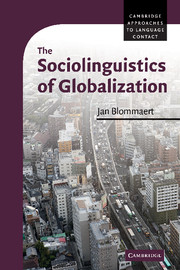Book contents
- Frontmatter
- Contents
- List of illustrations
- Series editor's foreword
- Preface
- Acknowledgements
- 1 A critical sociolinguistics of globalization
- 2 A messy new marketplace
- 3 Locality, the periphery and images of the world
- 4 Repertoires and competence
- 5 Language, globalization and history
- 6 Old and new inequalities
- 7 Reflections
- Notes
- References
- Index
3 - Locality, the periphery and images of the world
Published online by Cambridge University Press: 05 June 2012
- Frontmatter
- Contents
- List of illustrations
- Series editor's foreword
- Preface
- Acknowledgements
- 1 A critical sociolinguistics of globalization
- 2 A messy new marketplace
- 3 Locality, the periphery and images of the world
- 4 Repertoires and competence
- 5 Language, globalization and history
- 6 Old and new inequalities
- 7 Reflections
- Notes
- References
- Index
Summary
The world has become a complex place – that was the main line of argument in the previous chapter. In order to understand that place, we need to inquire into the way in which that place is imagined, represented and enacted by its inhabitants. This chapter will explore the conceptual complex that is central in globalization studies and hinges on notions such as centre and periphery, locality, flows, scales, networks, global economy and so forth. All of these notions refer to space and movements in/through space, and in particular the notion of ‘flow’ has already been productively adopted in sociolinguistics, as we saw earlier (Pennycook 2007). Theoretically, as we have seen, the main challenge for disciplines such as anthropology, sociology or sociolinguistics consists in loosening the connection between culture and a particular territory. Whereas more traditional approaches appeared to tacitly assume that societies and their features ‘belonged’ to one particular geographical area (think of our discussion of the linguistic rights paradigm in the previous chapter), and thus attributed an absolute spatiality to culture, the emphasis on situatedness emphasizes flows, trajectories, movements and thus the relative spatiality of culture. Hannerz (1991: 116–117) summarizes this as follows:
The connection between cultural process and territory, we should remind ourselves, is only contingent. As socially organized meaning, culture is primarily a phenomenon of interaction, and only if interactions are tied to particular spaces is culture likewise so.
- Type
- Chapter
- Information
- The Sociolinguistics of Globalization , pp. 63 - 101Publisher: Cambridge University PressPrint publication year: 2010
- 1
- Cited by

